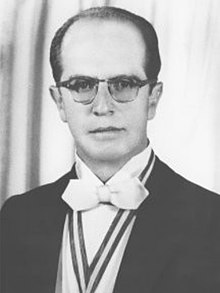Luis Adolfo Siles
Luis Adolfo Siles | |
|---|---|
 | |
| 59th President of Bolivia | |
| In office April 27, 1969 – September 26, 1969 | |
| Preceded by | René Barrientos |
| Succeeded by | Alfredo Ovando |
| Vice President of Bolivia | |
| In office 6 August 1966 – 27 April 1969 | |
| President | René Barrientos |
| Preceded by | René Barrientos |
| Succeeded by | Jaime Paz Zamora |
| Personal details | |
| Born | Luis Adolfo Siles Salinas June 21, 1925 La Paz, Bolivia |
| Died | October 19, 2005 (aged 80) La Paz, Bolivia |
| Political party | Social Democratic Party |
| Relations | Hernán Siles Zuazo (half-brother) |
Luis Adolfo Siles Salinas (June 21, 1925, La Paz, Bolivia – October 19, 2005, La Paz) was the Constitutional President of Bolivia for a period of five months between April and September 1969.
Background and early life
Born in La Paz, Luis Adolfo Siles was the son of former president Hernando Siles Reyes (1926–1930) and half-brother of another famous Bolivian politician and two-time president, Hernán Siles Zuazo (1956–1960 and 1982–1985). Educated as a lawyer in his native country, he also obtained a doctorate in Spain. Siles eventually joined the small Partido Demócrata Cristiano (Christian-Democrat Party), which supported René Barrientos in the 1966 elections. Eisenhower Fellowships selected Luis Adolfo Siles in 1955 to represent Bolivia.
Vice President of Bolivia
In fact, Siles ran as General Barrientos' vice-presidential running mate, and was sworn-in in that capacity after their ticket prevailed at the polls.[1]
President of Bolivia
Siles became President when Barrientos was killed in a helicopter crash near Arque, Cochabamba, on April 27, 1969.
The Siles presidency was short and marred by disagreements with the powerful Commander of the Armed Forces, General Alfredo Ovando. The latter harbored ambitions to become president in 1970, when he was projected to run as Barrientos' successor. But Ovando's disagreements with Barrientos on a number of important issues during the 1967-69 period had displeased many die-hard Barrientos followers, including Vice-President Siles. For these reasons, in addition to resentment over the constant meddling by Ovando, Siles seemed to be throwing his support behind the surprise candidacy of the Mayor of La Paz, Armando Escobar Uría, as the true heir and successor to Barrientos (Bolivian laws do not allow direct re-election of a sitting president). This threatened to spoil General Ovando's carefully laid plans.
Overthrown by a coup d'état
In the end General Ovando decided not to wait for the elections and instead launched a coup d'état on September 26, 1969, overthrowing Siles and with him, what was left of Bolivian democracy (or its appearances, in any case).
Later years
Returning to Bolivia during the dictatorship of Hugo Banzer (1971–78), Siles played a prominent role as a defender of human rights. He ran for president in 1980, but failed to garner much support. Despite leading a relatively small party, Siles vociferously opposed the 1980-81 dictatorship of Luis García Meza.
Death
Respected for his steadfast stance in defense of democratic principles, he died on October 19, 2005 in La Paz.

